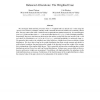Free Online Productivity Tools
i2Speak
i2Symbol
i2OCR
iTex2Img
iWeb2Print
iWeb2Shot
i2Type
iPdf2Split
iPdf2Merge
i2Bopomofo
i2Arabic
i2Style
i2Image
i2PDF
iLatex2Rtf
Sci2ools
STOC
2007
ACM
2007
ACM
Balanced allocations: the weighted case
We investigate balls-and-bins processes where m weighted balls are placed into n bins using the "power of two choices" paradigm, whereby a ball is inserted into the less loaded of two randomly chosen bins. The case where each of the m balls has unit weight had been studied extensively. In a seminal paper Azar et al. [2] showed that when m = n the most loaded bin has (log log n) balls with high probability. Surprisingly, the gap in load between the heaviest bin and the average bin does not increase with m and was shown by Berenbrink et al. [4] to be (log log n) with high probability for arbitrarily large m. We generalize this result to the weighted case where balls have weights drawn from an arbitrary weight distribution. We show that as long as the weight distribution has finite second moment and satisfies a mild technical condition, the gap between the weight of the heaviest bin and the weight of the average bin is independent of the number balls thrown. This is especially ...
Related Content
| Added | 03 Dec 2009 |
| Updated | 03 Dec 2009 |
| Type | Conference |
| Year | 2007 |
| Where | STOC |
| Authors | Kunal Talwar, Udi Wieder |
Comments (0)

